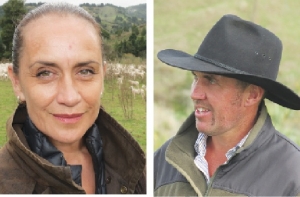Now, its sheep and beef unit is one of three finalists in this year’s Ahuwhenua Trophy for excellence in Maori farming.
“The farming philosophy is around maximising pasture production, optimising feed conversion and then maximising productivity,” says Te Uranga B2 chairman Traci Houpapa.
“When we set that as a goal three or four years ago it changed our focus in terms of the overall corporate farming model that we have. We started to think how we could lift our performance in terms of strategic and business planning, and our financial management became tighter.”
As well as running her own consultancy business, Houpapa is a director of Landcorp, Chairman of the Federation of Maori Authorities (FOMA) and is a director of a number of other companies.
Te Uranga B2 has 750 shareholders, a large number of whom live outside the district. Communication is an area where a lot of effort is directed to ensure people know what the organisation is doing and why. Houpapa says the Incorporation’s management committee’s role is to grow the wealth and wellbeing of these shareholders.
“To do this we also need to be aware that the decisions for the corporate body may not always be in line with the wants of our shareholder base, so there is that balancing act, but we have an intergenerational focus and we need to be thinking about what next in terms of our operation.”
An annual dividend of up to 20% of net profit after tax is paid to shareholders.
“We are also pretty clear that some of our shareholders want distribution in the form of grants and otherwise so we need to balance that out with the reinvestment in property and growth and development of the overall farming systems.”
As a management committee they are very focused on ensuring that they remain a successful and innovative operation, she adds.
While Te Uranga B2 was established 103 years ago, it has been trading in its own right since 1958. It has two dairy farms, a forestry block and some outside investments, but the focus for the field day was the 1,123ha sheep and beef unit which winters 12,100 stock units.
The 5,500 ewe flock is Romney/Coopworth, and there are 140 Angus breeding cows plus steers, heifers and weaners.
The land is a mixture of flat and hill country and while the dairy and sheep and beef operations are treated as separate business units for financial purposes they’re run as an integrated farming operation.
There’s a strong environmental focus and three Balance Farm Environment Awards have been won for work mitigating erosion and providing environmental buffer zones.
The finalists’ field days are the final phase of the Ahuwhenua Trophy judging process, a last opportunity of Te Uranga B2 to impress the judges. The initial judging panel was glowing in its praise of the Incorporation for its overall management, its commitment to Tikanga Maori and its strong leadership and governance.
Houpapa says as a management committee they are very focused on ensuring that they remain a successful and innovative operation. Besides farming, the Incorporation has a strong community focus, financially supporting the local Ngakonui school and a number of other local sporting, social and cultural activities and initiatives, but the task of delivering the farm strategy set by the committee falls to farm manager Jack Valois.
Valois is an experienced manager who’s worked for other Maori Incorporations and in the private sector. He’s been at Te Uranga 18 months and has set in place some changes designed to drive production, for example increasing lambing percentage from 120% to 140% by improving genetics, feeding, subdivision and water reticulation.
“The drought challenge for me this year was mainly lack of water. We simply didn’t have water in some paddocks.”
Improving stock water is part of a three-year plan.
“We have the water lines in now and it’s just a matter of tapping into these and installing troughs. Water is a big thing especially when you start fencing off the natural water ways which we are doing.”
Facial eczema and worms, especially liver fluke, are other key management challenges, he says, though FE has been somewhat taken care of by selection of resistant stock.
He’s also very focused on getting his ewes up to 65kg to ensure they are low maintenance in winter and produce a good lamb. Ewe lambs over 40kg will be mated to lamb as hoggets.
Present calving percentage is around 88%, his target being 90%.
Valois says he’s very much the traditional stockman, relying heavily on gut instinct to guide his decision making, but he is fan of NAIT.
“I am probably the only farmer in New Zealand that likes NAIT. It’s a good tool for me and helps me identify the best cattle I buy from which breeders. It allows me to do the weight gains, the predictions and stock counts. It’s all good for me. With NAIT you only get out of it what you put into it.”
Another key person on the Te Uranga B2 farm is AgFirst consultant, Darren McNae. He’s been involved since 2006 and says the Incorporation has always had good long-term plans.
Working for Te Uranga and other Maori incorporations is a pleasure because of their mantra of social, cultural and environmental goals as well as profit, he adds. Knowing the land will be held by one organisation forever changes the thinking and strategy.
“But it must make money. If the business is not making money it doesn’t allow them to generate the surpluses that allow them to do the environmentally focused work they are doing.”
Te Uranga spends about $40,000 a year on environmental matters, working closely with Horizons Regional Council to manage erosion and prevent sediment and phosphorous getting into waterways. Riparian planting is extensive, notes McNae.









